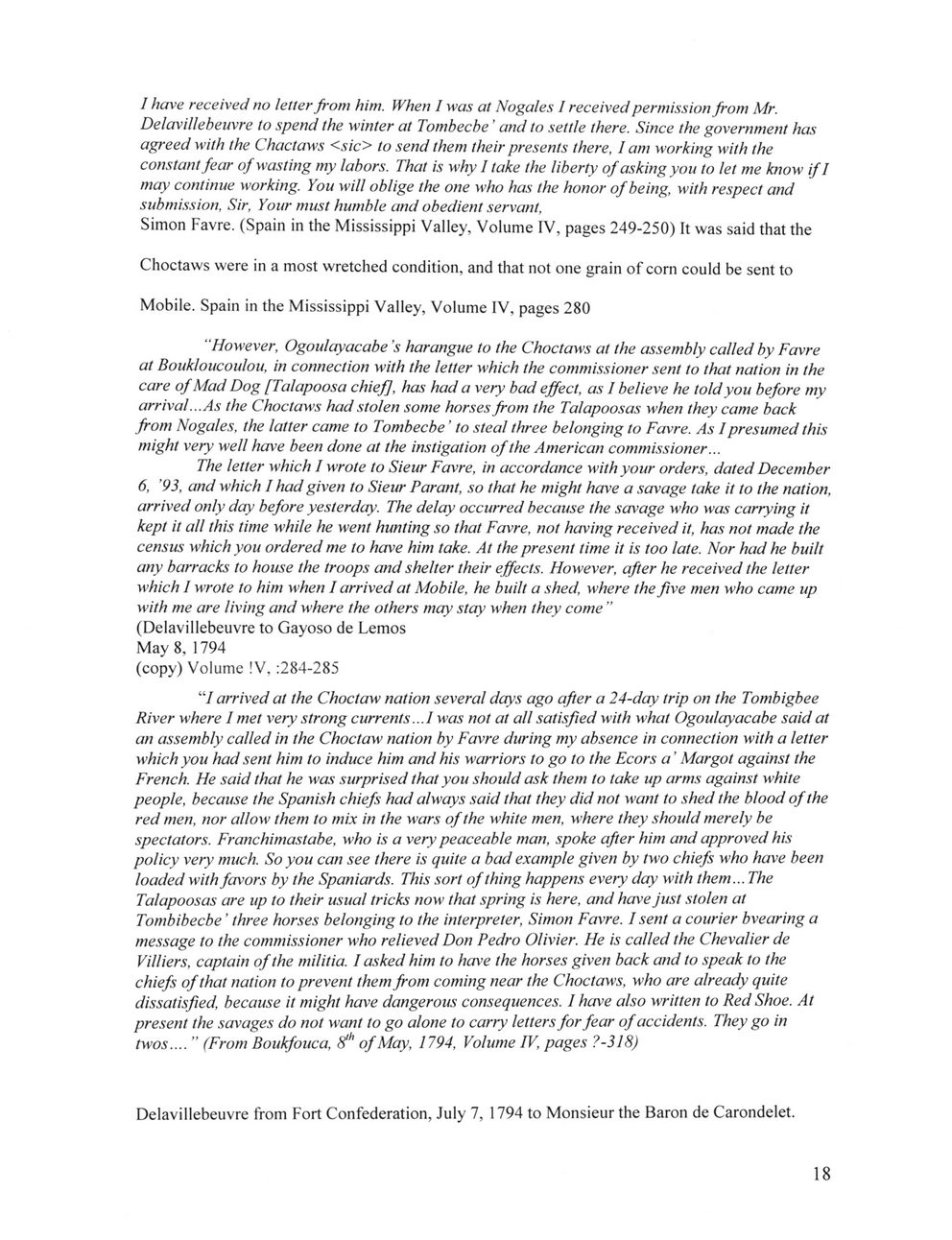This text was obtained via automated optical character recognition.
It has not been edited and may therefore contain several errors.
I have received no letter from him. When I was at Nogales I received permission from Mr. Delavillebeuvre to spend the winter at Tombecbe ? and to settle there. Since the government has agreed with the Chactaws <sic> to send them their presents there, I am working with the constant fear of wasting my labors. That is why I take the liberty of asking you to let me know if I may continue working. You will oblige the one who has the honor of being, with respect and submission, Sir, Your must humble and obedient servant, Simon Favre. (Spain in the Mississippi Valley, Volume IV, pages 249-250) It was said that the Choctaws were in a most wretched condition, and that not one grain of corn could be sent to Mobile. Spain in the Mississippi Valley, Volume IV, pages 280 ?However, Ogoulayacabe?s harangue to the Choctaws at the assembly called by Favre at Boukloucoulou, in connection with the letter which the commissioner sent to that nation in the care of Mad Dog [Talapoosa chief], has had a very bad effect, as I believe he told you before my arrival... As the Choctaws had stolen some horses from the Talapoosas when they came back from Nogales, the latter came to Tombecbe ? to steal three belonging to Favre. As I presumed this might very well have been done at the instigation of the American commissioner... The letter which I wrote to Sieur Favre, in accordance with your orders, dated December 6, ?93, and which I had given to Sieur Parant, so that he might have a savage take it to the nation, arrived only day before yesterday. The delay occurred because the savage who was carrying it kept it all this time while he went hunting so that Favre, not having received it, has not made the census which you ordered me to have him take. At the present time it is too late. Nor had he built any barracks to house the troops and shelter their effects. However, after he received the letter which I wrote to him when I arrived at Mobile, he built a shed, where the five men who came up with me are living and where the others may stay when they come ? (Delavillebeuvre to Gayoso de Lemos May 8, 1794 (copy) Volume !V, :284-285 ?7 arrived at the Choctaw nation several days ago after a 24-day trip on the Tombigbee River where I met very strong currents...I was not at all satisfied with what Ogoulayacabe said at an assembly called in the Choctaw nation by Favre during my absence in connection with a letter which you had sent him to induce him and his warriors to go to the Ecors a ? Margot against the French. He said that he was surprised that you should ask them to take up arms against white people, because the Spanish chiefs had always said that they did not want to shed the blood of the red men, nor allow them to mix in the wars of the white men, where they should merely be spectators. Franchimastabe, who is a very peaceable man, spoke after him and approved his policy very much. So you can see there is quite a bad example given by two chiefs who have been loaded with favors by the Spaniards. This sort of thing happens every day with them... The Talapoosas are up to their usual tricks now that spring is here, and have just stolen at Tombibecbe' three horses belonging to the interpreter, Simon Favre. I sent a courier bvearing a message to the commissioner who relieved Don Pedro Olivier. He is called the Chevalier de Villiers, captain of the militia. I asked him to have the horses given back and to speak to the chiefs of that nation to prevent them from coming near the Choctaws, who are already quite dissatisfied, because it might have dangerous consequences. I have also written to Red Shoe. At present the savages do not want to go alone to carry letters for fear of accidents. They go in twos.... ? (From Boukfouca, 8th of May, 1794, Volume IV, pages 7-318) Delavillebeuvre from Fort Confederation, July 7, 1794 to Monsieur the Baron de Carondelet. 18

Favre The-Favre-Family-in-Hancock-County-18